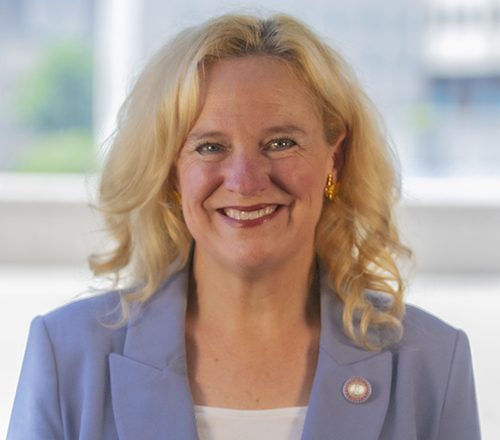On January 6, the Virginia Department of Education released a revised proposal of the state’s history and social science standards of learning, after previously proposed standards sparked severe public backlash in November. Critics—including educators, activist groups, parents, and Democratic lawmakers—accused Gov. Glenn Youngkin’s administration of whitewashing history, perpetuating political bias, and teaching historical inaccuracies.
In response, the state Board of Education delayed its review of the standards, and directed Jillian Balow, Virginia’s superintendent of public education, to correct errors, omissions, and inaccuracies; incorporate public feedback; and prepare a “crosswalk” document comparing the controversial draft to the standards proposed in August, which were based on two years of input from historians, educators, organizations, and representatives of marginalized groups, as well as thousands of public comments. In August and October, Balow asked the board to delay reviewing the 402-page original proposal to allow time to fix mistakes, gain more expert input, and address other concerns with the August proposal.
The newly released proposal includes both “content from earlier drafts” and “new content on events and historical figures previously overlooked in the commonwealth’s history standards,” according to a January 6 VDOE press release.
However, some educators claim the new 68-page standards are simply a “continuation” of the 53-page November proposal, according to Ma’asehyahu Isra-Ul, president of the Virginia Social Studies Leaders Consortium.
The new standards continue the erasure of Indigenous peoples, claims Isra-Ul. For example, in the elementary standards, Columbus Day and Yorktown Victory Day are listed as holidays students will study, but not Indigenous Peoples’ Day. Other holidays celebrated by minority groups—including Kwanzaa and Hanukkah—are also missing from the list. (The standards say that students will not be limited to learning about the listed holidays.)
Since January 6, Isra-Ul, chief lecturer of the Leading By History Collective and an education specialist, says he has received dozens of emails from Virginia educators sharing additional concerns about the new proposal. Some teachers are worried about the substantial amount of information K-3 students are expected to learn within a limited amount of time, while others argue content might be too advanced for certain grade levels.
In November, the VDOE corrected multiple errors within the Youngkin administration’s original proposal, including a reference to Indigenous peoples as “America’s first immigrants,” and the exclusion of Juneteenth and Martin Luther King Jr. Day from elementary standards. The new standards include several other historical events and terms concerning marginalized groups that were missing from the November proposal, including the Chinese Exclusion Act, Hitler’s “Final Solution,” and the gay rights movement. While the previous proposal said there were several causes for the Civil War, the new one says that “slavery and its expansion was the primary cause of the [issues] that divided the nation and was the catalyst for secession of southern states.”
But some criticisms of the November proposal remain in the new one. Sixth graders are expected to study U.S. immigration policies and the challenges immigrants have faced, while 11th graders must analyze “the effects of changes in immigration” across the country. However, the standards do not explicitly mention the history of the Latino or Asian American and Pacific Islander communities in the country. (In response to criticism about excluded content, Balow has said that some subjects will be included in the curriculum framework, which is expected to be publicly released this summer.)
Additionally, Isra-Ul questions who was involved in the drafting of the newly released standards. Critics lambasted the Youngkin administration for working with conservative outsiders on the November proposal, including the Fordham Institute, Hillsdale College, and Reagan education secretary William Bennett.
Following November’s public backlash, the VSSLC, Virginia Association for Supervision and Curriculum Development, and the American Historical Association released their own alternative standards in December. Isra-Ul says the groups reached out to the VDOE, but were not included in the November proposal development process. While working on their alternative proposal—which was completed in a little over a month, to meet the state education board’s timeline—the groups aimed to follow the board’s instructions to Balow, since they “didn’t know what [Balow] was going to do.”
Isra-Ul describes the alternative proposal as a combination of the August and November drafts, with corrected errors and omissions. It specifically includes edits proposed by the state’s African American History Education Commission, which he says were “completely disregarded” in the November proposal. “We used the [August] draft as the center and we found what could be salvaged from the November draft,” he explains.
The three groups urge the state education board to approve their proposal instead of the new standards, pointing to the endorsements they have received from the National Council for Social Studies, Virginia Council for the Social Studies, and Virginia Commission on Civic Education. The Charlottesville School Board has also expressed support for the standards. Virginia Humanities has called on the board to approve the August proposal, but hopes the board will discuss the alternative standards proposed by the three educational groups, too. The groups have not received a response from the board or Balow.
According to the VDOE, public hearings will be scheduled on the newly proposed standards “following acceptance of the draft” by the education board. The board’s next meeting is February 1.
Correction 1/11: Ma’asehyahu Isra-Ul is an education specialist and the chief lecturer of the Leading By History Collective. He is no longer an instructional specialist for Richmond Public Schools.
